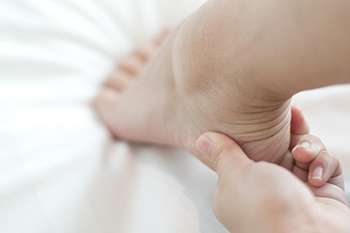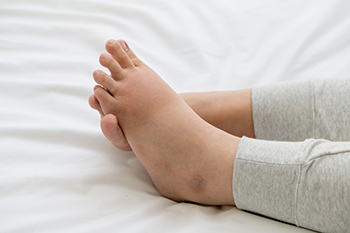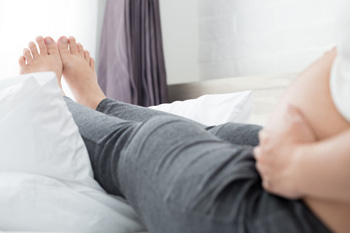Connect With Us
Blog
Items filtered by date: April 2023
Who Can Develop Sever’s Disease?

Sever’s disease is a condition that affects the heel of the foot. Children and young teenagers who are physically active may be prone to developing this ailment, which may cause the child to limp or walk on their tiptoes. It is defined as an inflammation of the muscles and tendons surrounding the growth plate in the heel, and it happens when this plate grows faster than the heel bone. This age group of children from 5 to 11 who frequently participate in running and jumping activities can develop this painful condition, which can be accompanied by swelling. Additional reasons why Sever's disease may happen can be from wearing shoes that do not fit correctly, being overweight, or if one leg is shorter than the other. Treatment often begins with temporarily stopping the activity that caused the pain and elevating the affected foot as often as possible. Wearing custom-made orthotics may help the child to feel better, which can provide the necessary support as the healing process occurs. If your child has symptoms of Sever’s disease, it is suggested that you confer with a podiatrist who can effectively determine the cause of their heel pain, and treat it accordingly.
Sever's disease often occurs in children and teens. If your child is experiencing foot or ankle pain, see one of our podiatrists from Omega Podiatry. Our doctors can treat your child’s foot and ankle needs.
Sever’s Disease
Sever’s disease is also known as calcaneal apophysitis, which is a medical condition that causes heel pain I none or both feet. The disease is known to affect children between the ages of 8 and 14.
Sever’s disease occurs when part of the child’s heel known as the growth plate (calcaneal epiphysis) is attached to the Achilles tendon. This area can suffer injury when the muscles and tendons of the growing foot do not keep pace with bone growth. Therefore, the constant pain which one experiences at the back of the heel will make the child unable to put any weight on the heel. The child is then forced to walk on their toes.
Symptoms
Acute pain – Pain associated with Sever’s disease is usually felt in the heel when the child engages in physical activity such as walking, jumping and or running.
Highly active – Children who are very active are among the most susceptible in experiencing Sever’s disease, because of the stress and tension placed on their feet.
If you have any questions, please feel free to contact our offices located in Los Angeles, Huntington Park, and Reseda, CA . We offer the newest diagnostic and treatment technologies for all your foot and ankle injuries.
Heel Pain in the Morning?
Various Reasons to Have Swollen Feet

Oedema is the medical name for fluid retention. The ankles and feet are common places for this to occur, and it may happen for various reasons. These can include heart or thyroid disease, pregnancy, and chronic lung conditions. Additionally, there may be existing medications that may lead to having swollen feet, consisting of specific antidepressants, or hormone replacement treatments. Some of the symptoms that people may experience with fluid retention can be tightened skin, abnormal skin color, or joints that may ache. Swollen feet may be controlled by drinking plenty of water daily, and eating foods that are rich in nutrients. It may also help to limit sodium intake, in addition to drinking less alcohol. If your feet have become swollen, it is suggested that you confer with a podiatrist who can determine what the cause is, and offer you treatment options that are correct for you.
Swollen feet can be a sign of an underlying condition. If you have any concerns, contact one of our podiatrists of Omega Podiatry. Our doctors can provide the care you need to keep you pain-free and on your feet.
Swollen feet are a common ailment among pregnant women and people who stand or sit for extended periods. Aging may increase the possibility of swollen feet and patients who are obese often notice when their feet are swelling too. There may be medical reasons why swollen feet occur:
- Phlebitis - A condition that causes the veins to become inflamed and can also cause leg pain.
- Liver disease - This may lead to low blood levels of albumin which is a protein. This can cause fluid in the blood to pass into the tissues and several areas of the body can become swollen.
- Heart failure - When the heart doesn’t pump properly the blood that is normally pumped back to the heart can pool in the veins of the legs causing swollen feet.
- Kidney disease - One of the main functions of the kidneys is releasing excess fluid in the body. This type of condition can make it difficult for the kidneys to function properly, and as a result the feet may become swollen.
- Deep-vein thrombosis (DVT)- This is a serious condition where blood clots form in the veins of the legs. They can block the return of blood from the legs to the heart which may cause the feet to swell. It is important to be treated by a podiatrist if this condition is present.
Swollen feet can also be caused by bone and tendon conditions, including fractures, arthritis, and tendinitis. Additionally, there may be skin and toenail conditions and an infection may cause the feet to swell. Patients who take medicine to treat high blood pressure may be prone to getting swollen feet.
Many patients elevate their feet to help relieve the swelling and this is generally a temporary remedy. When a podiatrist is consulted the reason behind the swelling can be uncovered and subsequently treated.
If you have any questions please feel free to contact our offices located in Los Angeles, Huntington Park, and Reseda, CA . We offer the newest diagnostic tools and technology to treat your foot and ankle needs.
A Sprained Second Toe

The majority of people that have pain in their second toe have endured an injury. It can happen if a heavy object drops on it, or from accidentally kicking something hard. Pain in this toe may cause difficulty while walking, in addition to affecting balance. The toe can become sprained, and this affects the ligament that connects two or more bones. A toe sprain can happen if the toe is twisted beyond its normal range of motion, or possibly from falling. The symptoms of a sprained second toe can include bruising, swelling, and intense pain. An X-ray can be taken to rule out a fracture, and this can be followed by beginning the correct treatment. This can consist of using the buddy taping method, which is done by taping the sprained toe to the toe next to it. This is generally successful in providing the necessary stability as it heals. If you have pain in your toes, it is suggested that you seek the counsel of a podiatrist who can guide you to the treatment that is best for you.
Toe pain can disrupt your daily activities. If you have any concerns, contact one of our podiatrists of Omega Podiatry. Our doctors can provide the care you need to keep you pain-free and on your feet.
What Causes Toe Pain?
Most severe toe pain is caused due to a sports injury, trauma from dropping something heavy on the toe, or bumping into something rigid. Other problems can develop over time for various reasons.
Toe pain can be caused by one or more ailments. The most common include:
- Trauma
- Sports injury
- Wearing shoes that are too tight
- Arthritis
- Gout
- Corns and calluses
- Hammertoe
- Bunions
- Blisters
- Ingrown toenails
- Sprains
- Fractures (broken bones)
- Dislocations
When to See a Podiatrist
- Severe pain
- Persistent pain that lasts more than a week
- Signs of infection
- Continued swelling
- Pain that prevents walking
Diagnosis
In many cases the cause of toe pain is obvious, but in others, a podiatrist may want to use more advanced methods to determine the problem. These can range from simple visual inspections and sensation tests to X-rays and MRI scans. Prior medical history, family medical history, and any recent physical traumatic events will all be taken into consideration for a proper diagnosis.
Treatment
Treatments for toe pain and injuries vary and may include shoe inserts, padding, taping, medicines, injections, and in some cases, surgery. If you believe that you have broken a toe, please see a podiatrist as soon as possible.
If you have any questions please feel free to contact our offices located in Los Angeles, Huntington Park, and Reseda, CA . We offer the newest diagnostic tools and technology to treat your foot and ankle needs.
Should Pregnant Women Wear New Shoes?

When a woman becomes pregnant, her body undergoes significant bodily changes that could negatively impact the health of her feet. During pregnancy, a woman’s feet can increase in size. Many pregnant women will often wonder whether they ought to wear new shoes during their pregnancy to accommodate this increase in the size of their feet. Some women will wear pregnancy shoes to better support their feet as they bring their baby to term. Pregnancy shoes of this kind can minimize pressure and pain. This type of shoe can also combat twists or sprains because it supports the ankle. Some pregnancy shoes are also designed without straps and laces to minimize the extent to which a pregnant woman would have to bend over to adjust the shoes. If you are pregnant or are planning on becoming pregnant, it is suggested that you are under the care of a podiatrist.
Pregnant women with swollen feet can be treated with a variety of different methods that are readily available. For more information about other cures for swollen feet during pregnancy, consult with one of our podiatrists from Omega Podiatry. Our doctors will attend to all of your foot and ankle needs.
What Foot Problems Can Arise During Pregnancy?
One problem that can occur is overpronation, which occurs when the arch of the foot flattens and tends to roll inward. This can cause pain and discomfort in your heels while you’re walking or even just standing up, trying to support your baby.
Another problem is edema, or swelling in the extremities. This often affects the feet during pregnancy but tends to occur in the later stages.
How Can I Keep My Feet Healthy During Pregnancy?
- Wearing orthotics can provide extra support for the feet and help distribute weight evenly
- Minimize the amount of time spent walking barefoot
- Wear shoes with good arch support
- Wear shoes that allow for good circulation to the feet
- Elevate feet if you experience swelling
- Massage your feet
- Get regular, light exercise, such as walking, to promote blood circulation to the feet
If you have any questions please feel free to contact our offices located in Los Angeles, Huntington Park, and Reseda, CA . We offer the newest diagnostic and treatment technologies for all your foot and ankle needs.
Blog Archives
- April 2024
- March 2024
- February 2024
- January 2024
- December 2023
- November 2023
- October 2023
- September 2023
- August 2023
- July 2023
- June 2023
- May 2023
- April 2023
- March 2023
- February 2023
- January 2023
- December 2022
- November 2022
- October 2022
- September 2022
- August 2022
- July 2022
- June 2022
- May 2022
- April 2022
- March 2022
- February 2022
- January 2022
- December 2021
- November 2021
- October 2021
- September 2021
- August 2021
- July 2021
- June 2021
- May 2021
- April 2021
- March 2021

